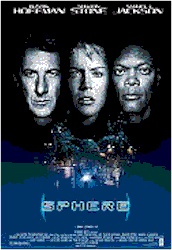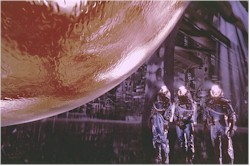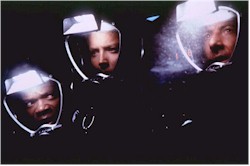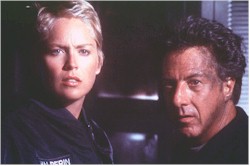|
| |
Sphere
Review by Carrie
Gorringe
Posted 13 February 1998
 |
|
Directed by Barry Levinson Starring
Dustin Hoffman, Sharon Stone,
Samuel L. Jackson, Peter Coyote, Queen Latifah,
Liev Schreiber and Marga Gomez
Screenplay by Kurt Wimmer and Paul Attanasio,
from the novel by Michael Crichton |
"What happens if Jerry gets mad?" Since the
questioner, Dr. Norman Goodman (Hoffman) is under one thousand feet of water at the time
he poses this dilemma to his co-scientists, and all are in a sanctuary which is at high
risk for either imploding or exploding, depending upon any given time of day, this is not
a good question to be asking. Goodman, Dr. Beth Halperin (Stone), Dr. Harry Adams
(Jackson) and Dr. Ted Fielding (Schreiber) were all brought to their current dilemma by
the discovery of a downed spaceship in several yards of coral. Since the rate of growth
for coral is fairly slow, there is enough evidence to suggest that this spaceship may have
crash-landed in the seventeenth century. This intriguing prospect is enough for the U.S.
Government to call in Goodman and company on the strength of a report that Goodman had
written on the subject of alien encounters a decade or so earlier. Unfortunately, as
Goodman is forced to confess, the entire report was based upon mere speculation and not
scientific proof; he wrote it to make mortgage payments, not history. The issue of
truth-in-writing is irrelevant to mission leader Harold Barnes (Coyote), who is determined
to get the scientists to the bottom of the ocean and of the situation.
 While exploring
the spaceship, Goodman and Adams come across a large translucent sphere which seems to
reflect only what it wishes to, and it takes a liking to the two scientists, allowing
Harry inside to view its contents. Soon, all is not well, as Harry goes native with a
vengeance; he begins crooning tunes from South Pacific, refusing to eat fish and
begins reading a version of Jules Verne’s 20,000 Leagues Under the Sea.
Normally, the latter occurrence wouldn’t be an issue – except for the text that
stops at page eighty-seven, and the fact that only Harry can discern whatever message is
on those blank pages. Furthermore, whenever the underwater sanctuary is attacked, Harry is
usually asleep. Eventually, the team makes contact with an alien entity (the
aforementioned "Jerry") who goes from being happy to issuing threats to kill
everyone on board whenever the conversation turns to their imminent departure from the
underwater underworld. Yet, as the bodies pile up, Harry seems remarkably unaffected by
the goings-on and suspicion arises that he is, perhaps, suffering from more than a mild
case of the psychological bends. While exploring
the spaceship, Goodman and Adams come across a large translucent sphere which seems to
reflect only what it wishes to, and it takes a liking to the two scientists, allowing
Harry inside to view its contents. Soon, all is not well, as Harry goes native with a
vengeance; he begins crooning tunes from South Pacific, refusing to eat fish and
begins reading a version of Jules Verne’s 20,000 Leagues Under the Sea.
Normally, the latter occurrence wouldn’t be an issue – except for the text that
stops at page eighty-seven, and the fact that only Harry can discern whatever message is
on those blank pages. Furthermore, whenever the underwater sanctuary is attacked, Harry is
usually asleep. Eventually, the team makes contact with an alien entity (the
aforementioned "Jerry") who goes from being happy to issuing threats to kill
everyone on board whenever the conversation turns to their imminent departure from the
underwater underworld. Yet, as the bodies pile up, Harry seems remarkably unaffected by
the goings-on and suspicion arises that he is, perhaps, suffering from more than a mild
case of the psychological bends.
 The film itself has
some problems with too much nitrous oxide in its system, what with its woozy approach to
narrative inconsistency, despite the best intentions of Levinson and his screenwriters.
It’s mystifying to understand just how this situation could have evolved, since the
technical and stylistic details in the direction and scripting appear to be of very high
quality, with very few (if any) false notes in the dialogue, framing and editing – at
least, as far as the first ninety minutes or so of Sphere is concerned. Generally
speaking, Sphere has enough suspenseful moments to make you pop up in your seat
quite regularly; despite reports suggesting that the film was shut down at some point
during its filming, a shutdown is not sufficient to throw a film off course, if its
central premise has enough richness to sustain the momentum on screen. Unfortunately, it
would appear that, in the process of funding the special effects, someone on the
production line-item-vetoed the script’s proofreading budget , because the errors
contained therein suggest that the problems with the script were easily traceable to
Crichton’s source, and the carelessness of the screenwriters in not catching said
errors from the start.. The film itself has
some problems with too much nitrous oxide in its system, what with its woozy approach to
narrative inconsistency, despite the best intentions of Levinson and his screenwriters.
It’s mystifying to understand just how this situation could have evolved, since the
technical and stylistic details in the direction and scripting appear to be of very high
quality, with very few (if any) false notes in the dialogue, framing and editing – at
least, as far as the first ninety minutes or so of Sphere is concerned. Generally
speaking, Sphere has enough suspenseful moments to make you pop up in your seat
quite regularly; despite reports suggesting that the film was shut down at some point
during its filming, a shutdown is not sufficient to throw a film off course, if its
central premise has enough richness to sustain the momentum on screen. Unfortunately, it
would appear that, in the process of funding the special effects, someone on the
production line-item-vetoed the script’s proofreading budget , because the errors
contained therein suggest that the problems with the script were easily traceable to
Crichton’s source, and the carelessness of the screenwriters in not catching said
errors from the start..
Whatever your opinion concerning the overall quality of Crichton’s writing, his
journeyman’s approach to plot and character construction makes him an understandable
darling for screenwriters. He provides expository information at exactly the time that his
audience needs it. Sometimes there’s just a little too much information, but at least
the audience can get some learnin’ with their thrills. There exists, however, one
nagging problem with all of Crichton’s work that allows it to just miss the threshold
of complete entertainment: as the ending draws near, everything can be summed up (and
usually is) in the most banal of didactic phrases, usually something along the lines of
"Don’t play God" or "Remember what’s really important in
life."  Now,
while such a dissipation of thematic richness in favor of empty pretentiousness isn’t
automatically harmful to the work in question (especially where there are sufficient
distractions to conceal this particular weakness) it actually has disastrous consequences
here, because several promising sub-plots, such as the premise of a nearly 300-year-old
space journey, are discarded with a degree of arbitrariness and indifference to the end
product that can only be described as shocking; under the circumstances the viewer is left
suffering from a bad case of narratus interruptus . The central theme of Sphere
– taken verbatim from the film – is, "We’re not ready." This line
could have been lifted from a forty-year-old Jules Feiffer cartoon about the reluctance to
take on additional responsibility at any age. Unlike Pfeiffer’s protagonist, who
deserts his family to run screaming into the woods, the audience for Sphere is left
in place, stunned; nerves stretched taut by nearly two hours of skillfully-rendered
suspense and the whole exercise, in the end, feels like a cheat. Perhaps the real model
for Sphere is not Pfeiffer but songwriters Leiber and Stoller. If we had only have
heard Peggy Lee crooning Is That All There Is? under the final credits, Sphere’s
chief deficiency could not have been more apparent. Now,
while such a dissipation of thematic richness in favor of empty pretentiousness isn’t
automatically harmful to the work in question (especially where there are sufficient
distractions to conceal this particular weakness) it actually has disastrous consequences
here, because several promising sub-plots, such as the premise of a nearly 300-year-old
space journey, are discarded with a degree of arbitrariness and indifference to the end
product that can only be described as shocking; under the circumstances the viewer is left
suffering from a bad case of narratus interruptus . The central theme of Sphere
– taken verbatim from the film – is, "We’re not ready." This line
could have been lifted from a forty-year-old Jules Feiffer cartoon about the reluctance to
take on additional responsibility at any age. Unlike Pfeiffer’s protagonist, who
deserts his family to run screaming into the woods, the audience for Sphere is left
in place, stunned; nerves stretched taut by nearly two hours of skillfully-rendered
suspense and the whole exercise, in the end, feels like a cheat. Perhaps the real model
for Sphere is not Pfeiffer but songwriters Leiber and Stoller. If we had only have
heard Peggy Lee crooning Is That All There Is? under the final credits, Sphere’s
chief deficiency could not have been more apparent.
As in all too many films of late, the responsibility falls solely upon the actors in
this ensemble to fashion haute-couture acting from the shoddiness of their source
material and, to their mutual credit, the well-oiled machine of performances on board
almost makes the entire enterprise worthwhile. Hoffman, Jackson and Schreiber have such
incredible camaraderie on screen that you can dismiss much of the narrative idiocy, and,
more remarkably, do so throughout the majority of the film. It has been rumored that
Sharon Stone was somewhat displeased with the nature of her role in a "buddy"
film, but it’s difficult to see how she is damaged in any way by her position in the
film. Granted, she has been shorn of the usual glamorous trappings that make up her
general cinematic persona, but maybe she should do this sort of thing more often, because
her input into the vulnerable Beth provides her with the best showcase for her acting
talents since her film-saving performance in Casino.
Even Queen Latifah and Marga Gomez bring as much personality as they can to their brief
and thankless roles as nearly-nameless and faceless crew members. If it weren’t for
these saving graces, this film would have been beyond the help of any decompression
chamber, but it’s definitely time for Crichton, Levinson, et al. to book a session or
two therein for themselves.
Contents | Features
| Reviews | Books | Archives | Store
Copyright © 1999 by Nitrate Productions, Inc. All Rights
Reserved.
| |
|